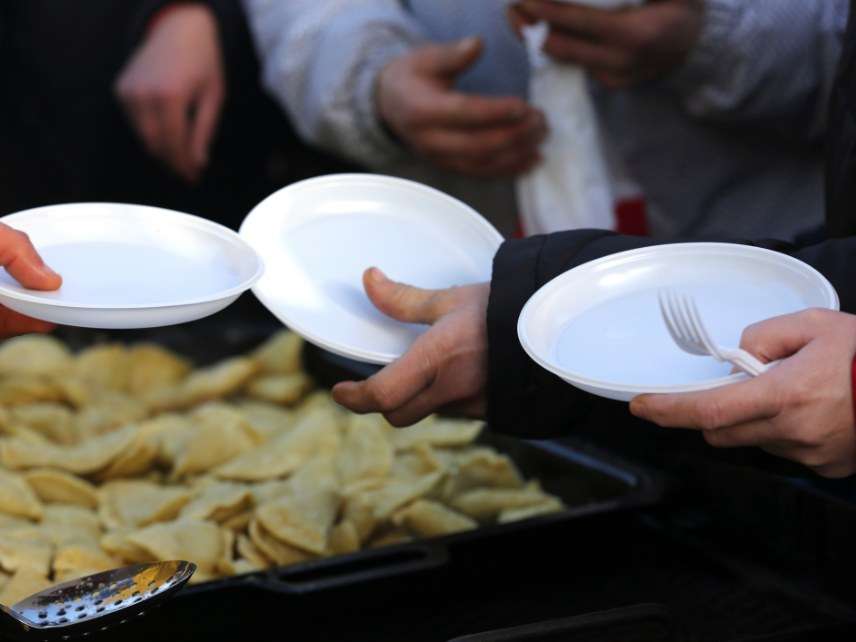Atlanta Targets Good Samaritans Sharing Food with Homeless
Feed yourself in a public park. Feed the pigeons and the squirrels there, too. Whatever you do, though, don't share your food with a hungry person.

Police in Atlanta are the latest blunt instrument around the country used to crack down on people sharing food with those in need.
Though the Fulton County permit requirement Atlanta police claim to be enforcing has been on the books for many years, it appears Atlanta's mayor only decided recently to enforce it, just in time for Thanksgiving. Violators face potential fines.
This crackdown is part of a larger, awful, and national trend.
"Beginning in the mid-2000s… many cities around the country began to crack down on good Samaritans… who provide food to the homeless and less fortunate," I write in my recent book, Biting the Hands that Feed Us: How Fewer, Smarter Laws Would Make Our Food System More Sustainable.
An Atlanta Indymedia video, posted on YouTube last month, shows several police officers in and around Hurt Park, which lies at the center of Georgia State University's campus, making vague threats against people who are feeding others or arriving with the intent do so.
Early in the video, for example, we see a flabbergasted woman—who says she's a licensed baker and had just driven for an hour to deliver baked goods to the homeless—turned away by the police. The video later shows at least one person holding a ticket she said officers issued her for allegedly violating county health department foodservice regulations. On the video, she describes the ticket as the same one a restaurant might receive for selling food without a permit.
Many of the Atlanta good Samaritans belong to a nonprofit group called Food Not Bombs. The group has been sharing food with those in need in Hurt Park for many years. I first wrote about Food Not Bombs in a 2011 Hit & Run blog post that detailed how members of the group had been arrested in Orlando for violating that city's similarly unconstitutional ban on sharing food with that city's homeless.
Volunteers who appear in the video say they'll continue to share food with those in need. Adele Mclean, one of the volunteers who was ticketed, has a court date next week. She says she'll back in the park, law or no law.
In Houston, another city with an awful feeding ban that I discuss in my book, one man is also fighting back. Earlier this year, Phillip Paul Bryant sued Houston, arguing that the city's ban infringes on his constitutional rights. That follows separate lawsuits against Las Vegas and Philadelphia (both of which I first discussed here) by local ACLU chapters.
"What kind of a city—what kind of a human being—would tell others that they couldn't share food with those in need?" I ask in Biting the Hands that Feed Us.
Then-New York City mayor Michael Bloomberg famously banned people from donating food to city shelters in 2012 "because the city can't assess their salt, fat and fiber content."
In Atlanta, one face of the ban is Georgia State University Police Chief Joseph Spillane.
"Efforts to feed the hungry can be a drain on resources when trash is left and security is required," reports Georgia State University's student paper, the Signal, "according to Chief Spillane."
Judging by the number of police officers milling about the park and ticketing people in the Indymedia recording, the police themselves are solely responsible for that drain on resources. No one's security appears to be threatened, either, save by police.
And what of the alleged trash Spillane cites? Volunteers on the Indymedia video balk at that claim, saying they bring their own trash bags and remove and dispose of any trash generated during the feeding program.
Chief Spillane, who says he's grateful for all the support he received after a recent drunk-driving arrest and related suspension, goes on to argue that volunteers who are providing support to the homeless are doing little more than "throwing some food" at those in need.
Some critics also contend that sharing food with the homeless doesn't solve the problem of homelessness. And they're right! You know what also doesn't solve the problem? Everything from not sharing food with the homeless to rooting for a football team that blows a 28-3 lead in the Super Bowl to—at least to date—every other human action intended to solve the problem of homelessness.
If Atlanta officials can solve the problem, then by all means they should share their plan. Otherwise, they should get out of the way of those who want to help.


Show Comments (94)